
 Monday, July 15, 15th Week in Ordinary Time
Monday, July 15, 15th Week in Ordinary Time
MEMORIAL OF ST. BONAVENTURE

 Two great 17th century Spanish artists, Francisco Herrera the Older, and Francisco Zurbaran, painted scenes from the life of St. Bonaventure. From left, his parents bring the child Bonaventure to be healed by
Two great 17th century Spanish artists, Francisco Herrera the Older, and Francisco Zurbaran, painted scenes from the life of St. Bonaventure. From left, his parents bring the child Bonaventure to be healed by
St. Francis of Assisi; Bonaventure joins the Franciscan order; an angel communicates to the saint; the saint in prayer; Bonaventure at the Council
of Lyons; death of the saint. The first 3 canvases by Herrera were painted in 1628; the next 3 panels by Zurbaran were painted in 1629.
ST. BONAVENTURA DA BAGNOREGIO
This great saint was, of course, the subject of Joseph Ratzinger's dissertation to obtain his Habilitation as a German university professor in 1954. He spoke about Bonaventure during
his pilgrimage in September 6, 2009, to his hometown of Bagnoregio
www.vatican.va/holy_father/benedict_xvi/speeches/2009/september/documents/hf_ben-xvi_spe_20090906_bagnoregio...
and in three catecheses on March 3, 10 and 17, 2011
www.vatican.va/holy_father/benedict_xvi/audiences/2010/inde...
Readings for today's Mass:
www.usccb.org/bible/readings/071513.cfm
AT THE VATICAN TODAY
No events announced for Pope Francis. For all intents and purposes, he has been 'on vacation' since the start of the month.
In one week he leaves for WYD 2013 in Rio de Janeiro.
 One year ago...
One year ago...
...On the other hand, it was a big day for the officially vacationing Benedict XVI in Castel Gandolfo. He made a pastoral visit to Frascati, one of the Castelli Romani towns near Castel Gandolfo and one of the suburbicarian dioceses of Rome whose churches are held titularly by the Church's most senior active cardinals. In his homily at the Mass, the Pope reminded the faithful that the Church's mission of evangelization is never-ending, and stressed the need to 'form the formators' well. Later, at the Sunday Angelus in Castel Gandolfo, he recalled the saint of the day, Bonaventure, whose life and theology, as well as his view of history, were thoroughly Christ-centered.

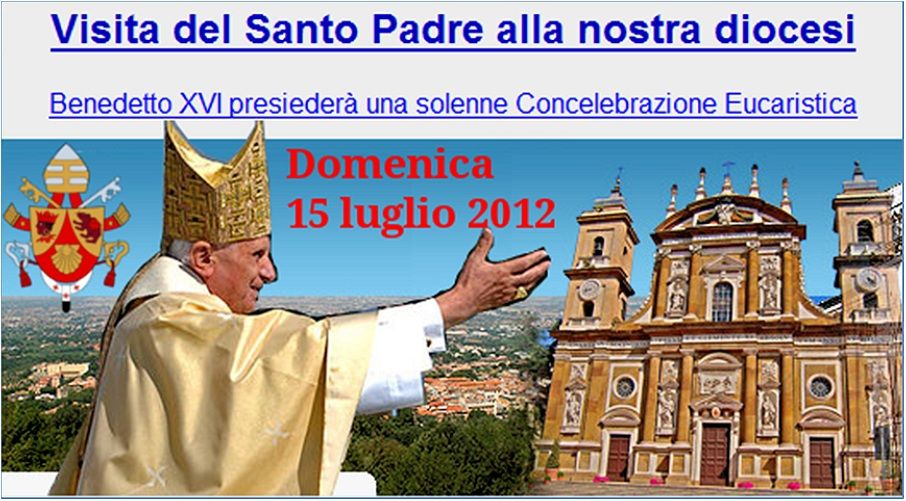 THE POPE IN FRASCATI
Arriving at Cathedral Square for an official welcome ceremony.
THE POPE IN FRASCATI
Arriving at Cathedral Square for an official welcome ceremony.
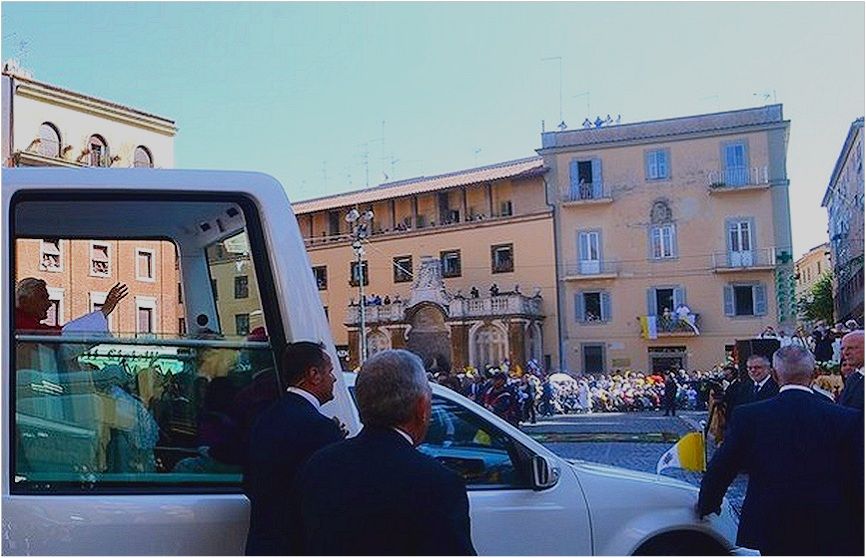
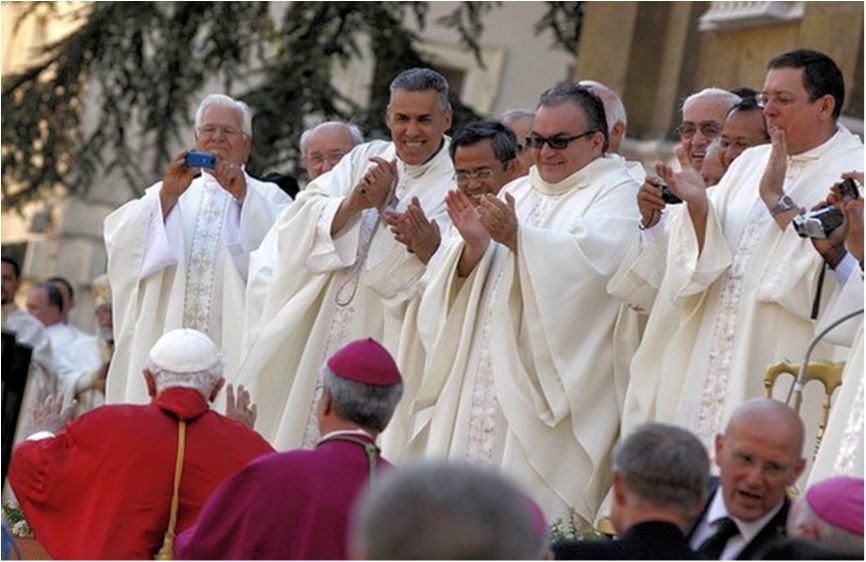
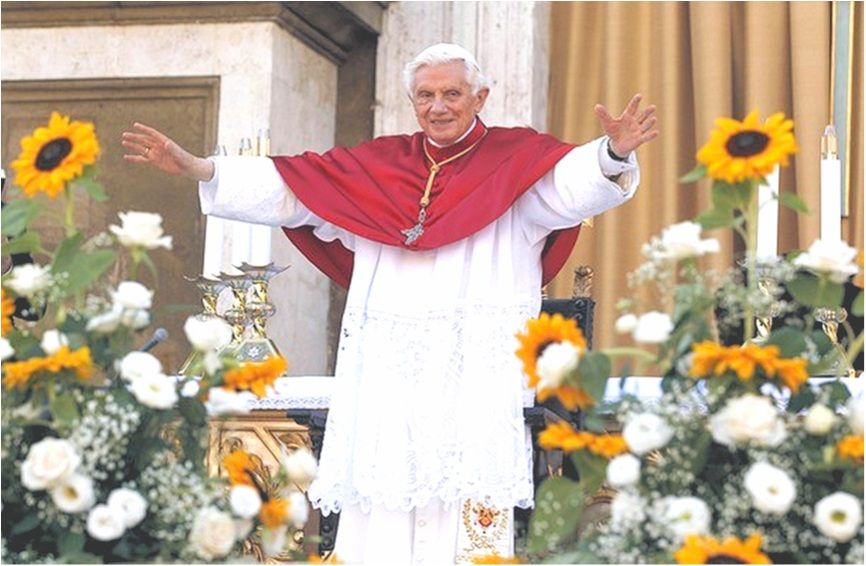 A brief moment of Adoration in the Cathedral before vesting for Mass.
A brief moment of Adoration in the Cathedral before vesting for Mass.
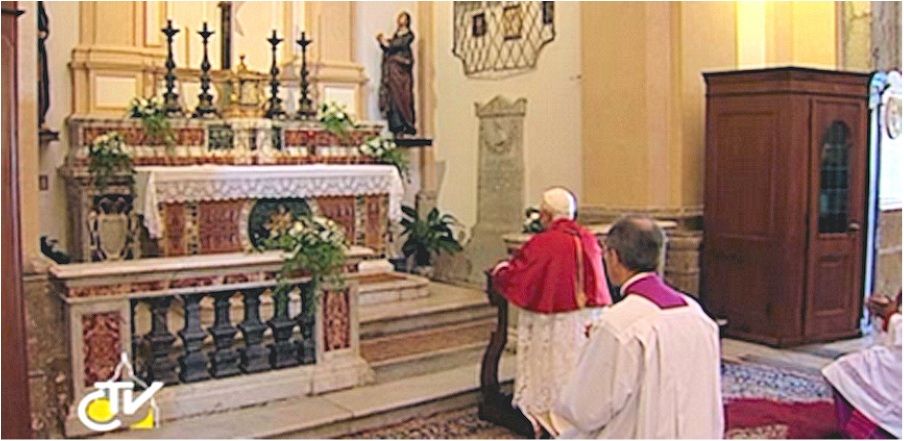
The Mass
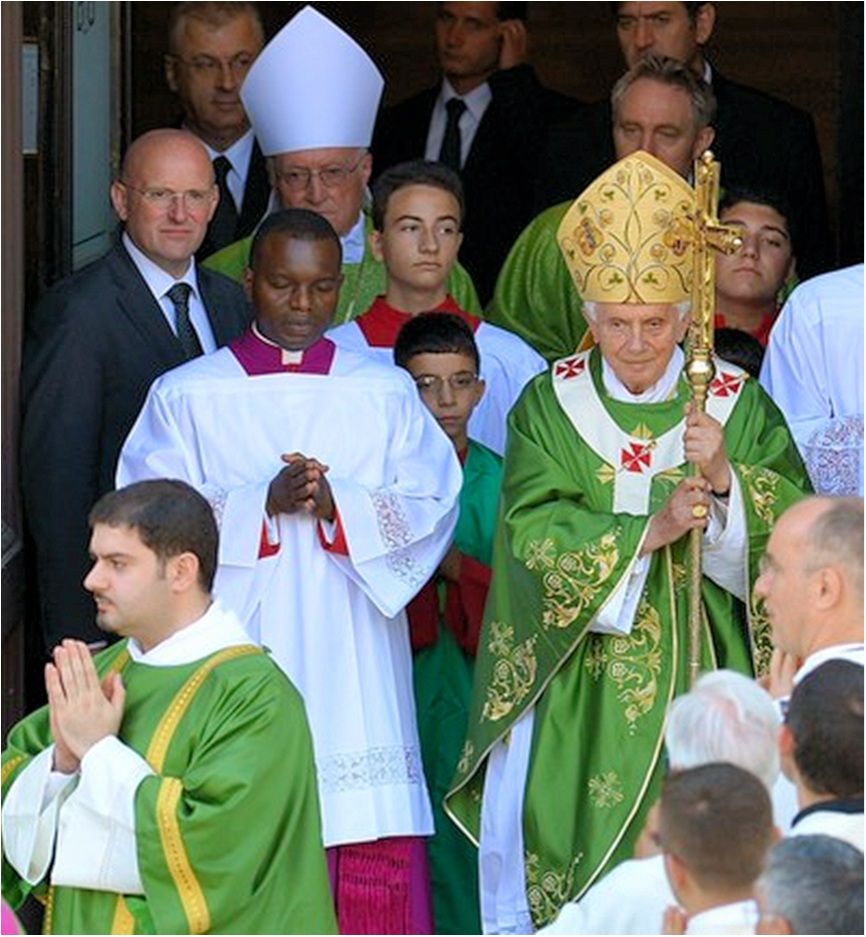
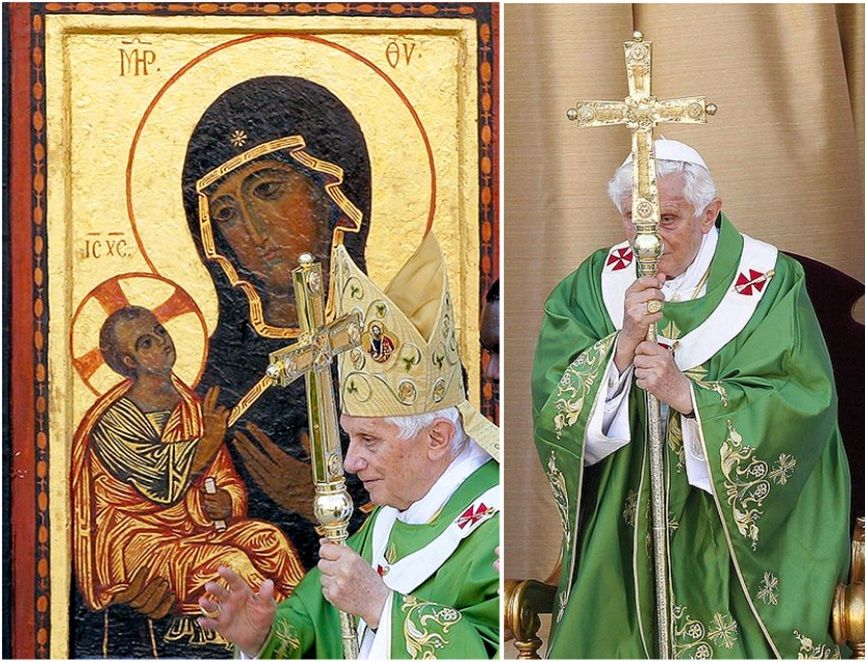
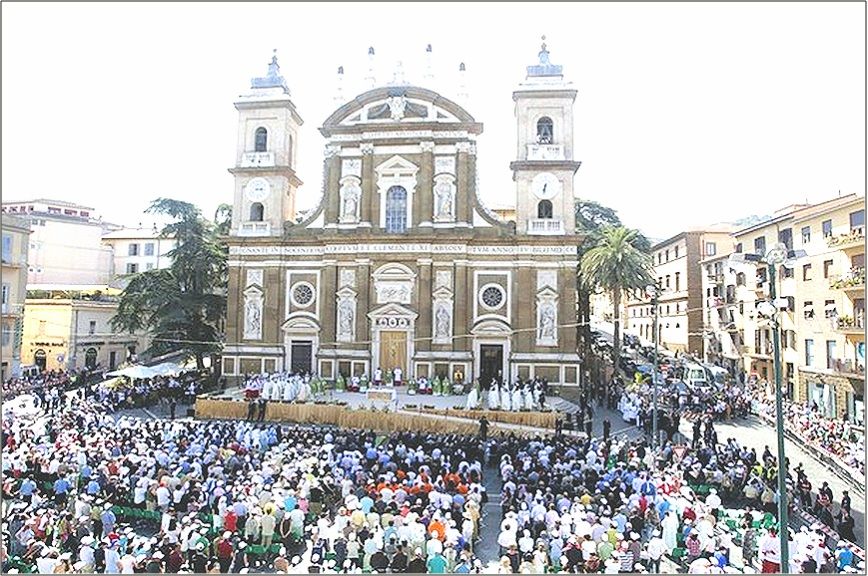
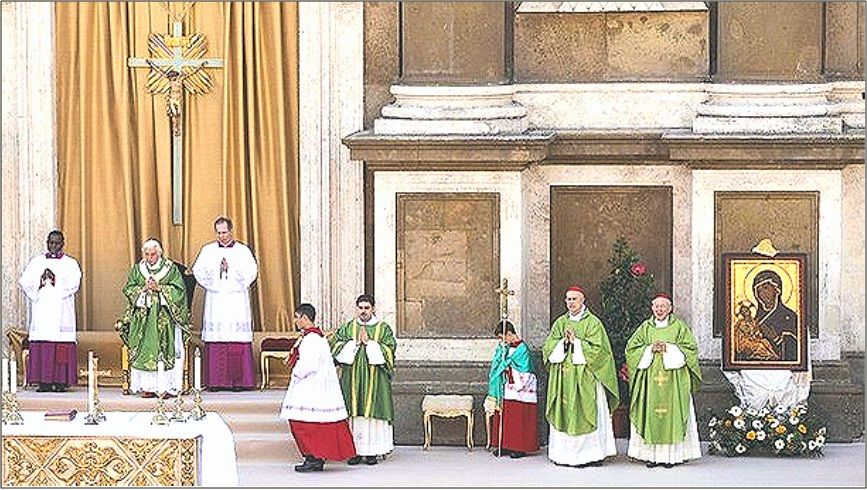
]
'God calls, we need to listen'

July 15, 2012
On the eve of the Year of Faith and the Synod on New Evangelization, Pope Benedict XVI launched a call to mission Sunday as he told the faithful of Frascati that they share responsibility for the formation of new generations of Christians - that God is calling, and Christians must listen.
Rediscovering the beauty of faith, of 'being Church', means carrying on Christ’s work of “forming the formators”, clergy, religious and above all laymen. He said that being missionaries - like the Apostles - can mean rejection and persecution,\; it means preaching "truth and justice" even if goes against applause and human power. Emer McCarthy reports:
Eight thousand people were packed into the tiny square in front of the Cathedral of St Peter the Apostle for Sunday morning Mass presided by Pope Benedict. Loud speakers relayed the liturgy throughout the winding cobbled streets of the hill top town, festooned with white and yellow flags and banners bearing Pope Benedict’s coat of arms.
The Pope was greeted on behalf of the suburbicarian diocese by Bishop Raffaele Martinelli, who spoke of Frascati’s deep bonds with the Successor of St Peter, and his personal witness, during a period of service at the Congregation for the Doctrine of the Faith, of then Cardinal Ratzinger’s tireless work on behalf of the Church.
Bishop Martinelli presented Pope Benedict with a donation for his personal charities on behalf of his community, and asked the Pope to confirm his people in their faith.
Later, at Mass, the Pope dedicated his homily to the history of mission and evangelization in the Church, which he noted is never-ending : “It is a beautiful and exciting thing to see that after two thousand years, we are still carrying on Christ’s commitment to formation!”
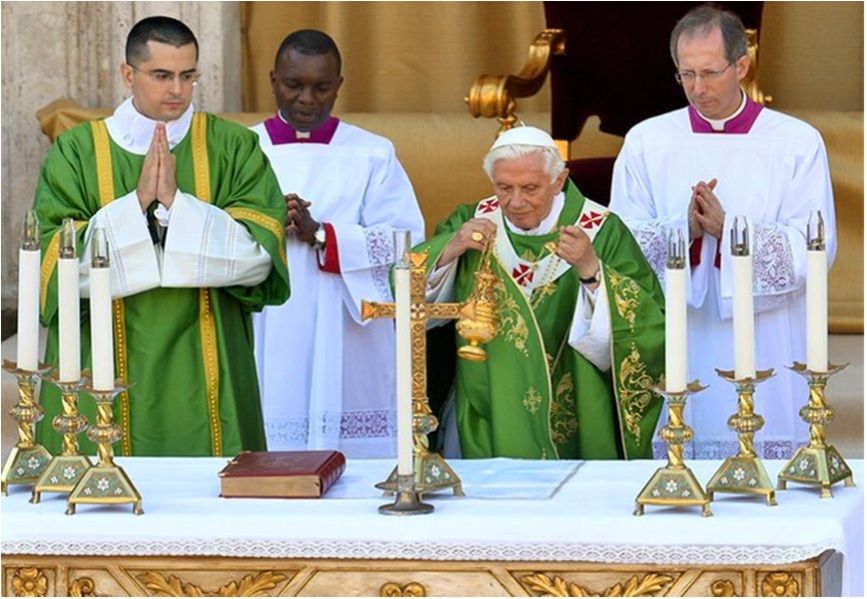
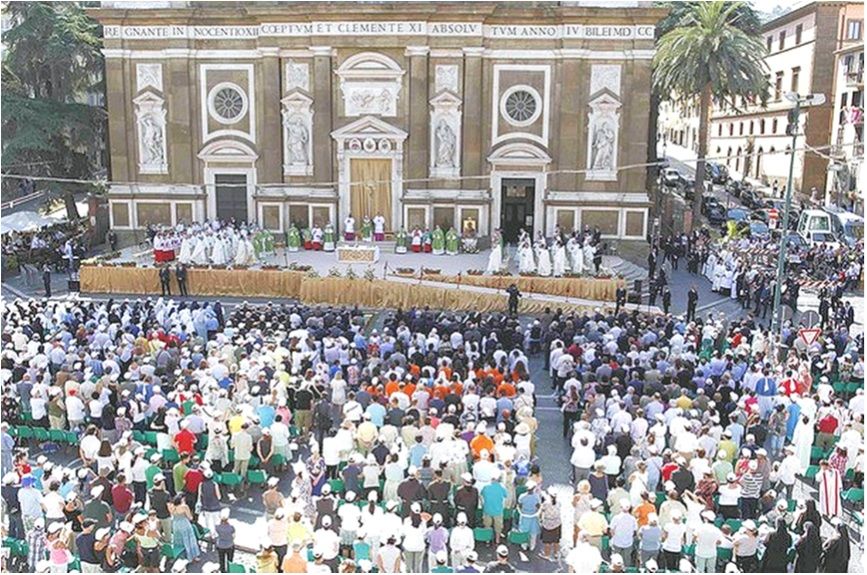
Here is a full translation of the Pope's homily:
Dear brothers and sisters,
I am very glad to be among you today to celebrate this Eucharist and to share the joys and hopes, efforts and commitments, ideals and aspirations, of this diocesan community.
I greet Cardinal Tarcisio Bertone, my Secretary of State and the titular bishop of this diocese. I greet your Pastor, Mons. Raffaele Martinelli, and the Mayor of Frascati, for the kind words with which they welcomed me in the name of you all.
I gladly greet the Minister representing the Italian government, the presidents of the region and the province, the mayor of Rome, the other mayors present and all the various authorities.
I am indeed very happy to celebrate the Mass today with your Bishop. As he said, he was for more than 20 years a most faithful and competent co-worker at the Congregation For the Doctrine of the Faith, where he worked mostly in the section on the Catechism and catechetical instruction, silently and discreetly. He contributed to the Catechism of the Catholic Church published in 1992 and to the subsequent Compendium of the Catechism. His voice is very much present in this great symphony of faith.
In the Gospel for this Sunday, Jesus takes the initiative to send the twelve Apostles on mission (cfr Mk 6,7-13). In fact, the word 'apostle' means 'messenger, envoy'. Their vocation was fully realized after the resurrection of Christ, with the gift of the Holy Spirit on Pentecost.
Nonetheless, it is very important that from the very beginning, Jesus wanted to involve the Twelve in his activities: It was a kind of apprenticeship for the great responsibility that awaited them. The fact that Jesus called some disciples to collaborate directly in his mission manifests an aspect of his love: namely, that he did not disdain the help that other men could bring to his work. He knew their limitations, their weaknesses. yet he did not appreciate them any less, but conferred on them the honor of being his messengers.
Jesus sent them out in pairs and gave them instructions, which the evangelist Mark summarizes in a few sentences. The first has to do with the spirit of detachment: the apostles must not be attached to money and to comforts. Jesus then warned his disciples that they would not always receive a favorable welcome - that sometimes, they would be rejected - in fact, they could be persecuted. But that this should not deter them, that they must speak in the name of Jesus and preach the Kingdom of God, without being concerned about 'succeeding". They should leave that to God.
The first Reading today presents us with the same perspective, chowing us that God's messengers are not always welcome. This was the case with the prophet Amos, who was sent by God to prophecy at the shrine of Bethel, in the Kingdom of Israel (cfr Am 7,17-18).
Amos preached with great energy against injustices, denouncing above all the abuses of the king and his notables - abuses that offended the Lord such that their acts of worship were in vain. And so, Amasiah, priest of Barthel, ordered Amos to leave. He answered that he had not chosen this mission, but that the Lord had made him his prophet and had specifically sent him there, to the Kingdom of Israel. And therefore, whether he was accepted or rejected, he would continue to prophesy, preaching what God says and not what men want to hear.
This remains the mandate of the Church, which does not preach what the powerful want to hear. The criterion is truth and justice even if this does not earn applause and opposes human power.
Likewise, in the Gospel, Jesus warns the Twelve that it could happen they would be rejected in some places. In which case they ought to go elsewhere after having made the gesture to the people of shaking the dust from under their feet, as a sign of detachment in two senses - a moral detachment to say, "The announcement has been made - it is you who reject it"; and a material distance, "We did not want nor do we want anything from you" (cfr Mk 6,11).
The other very important indication from the Gospel passage today is that the Twelve could not just be content with preaching conversion: Following the example of Jesus, preaching should be accompanied by healing the sick - a physical and spiritual healing.
He speaks of concretely healing ailments, but he also speaks of chasing out demons, that is, to purify the human mind, to cleanse it, to clear the eyes of the soul that have been darkened by ideologies and therefore, can no longer see God, and cannot see truth and justice.
This double healing, corporal and spiritual, is always the mandate for Christ's disciples. Therefore, the apostolic mission should always encompass the two aspects of preaching the Word of God and manifest his goodness in acts of charity, service and dedication.
Dear brothers and sisters, I give thanks to God who has sent me today to re-announce to you the Word of salvation. A word which is the basis of the Church's life and action. as it is of the Church in Frascati.
Your bishop has informed me of the pastoral commitment that is closest to your heart, which is substantially a formative commitment principally addressed to the formators, that is, to 'form the formators'.
It is precisely what Jesus did with his disciples: He instructed them, prepared them, formed them through missionary apprenticeship, so that they would be able to assume apostolic responsibility in the Church.
In the Christian community, this is always the first service offered by the responsible authorities: Starting with parents, who fulfill the educational mission for their children in the family; the parish priests, who are responsible for formation in the community; to all the priests in their various fields of work - in which they all must carry out an educational responsibility as priority; and the lay faithful, who, besides their role as parents, are also involved in formative services with young people and adults, as officials in Catholic Action or other ecclesial movements, or employed in civic and social activities, always with great attention to the formation of persons.
The Lord calls us all, distributing different gifts for different tasks in the Church. He calls to priesthood and the consecrated life, he calls to matrimony and to engagement as laymen in the Church herself and in society.
It is important that the riches in these gifts find full acceptance, especially on the part of young people; that they may feel the joy of responding to God with all of themselves, through priesthood or the consecrated life, or through matrimony - two ways that are complementary and that enlighten each other. They enrich each other, and together they enrich the community.
Virginity for the Kingdom of God, and matrimony, are both vocations, a calling from God which must be answered with and for all one's life. God calls - we must listen, accept and respond. Like Mary - "Here I am - be it done to me according to your will" (cfr Lk 1,38).
Even here, in the diocesan community of Frascati, the Lord sows his gifts with largesse, calling you to follow him and to prolong his mission into our day.
Even here, there is need for the new evangelization, and for this, I ask you to live intensely the Year of Faith which begins in October, 50 years since the opening of the Second Vatican Council.
The documents of the Council contain an enormous wealth for the formation of the new Christian generations, for the formation of our conscience. Therefore, read them. Read the Catechism of the Catholic Church, and thus you will rediscover the beauty of being Christian, of being Church, of living the great 'we' that Jesus has assembled around him, in order to evangelize the world: the 'we' of the Church is never closed, it is always open and oriented towards announcing the Gospel.
Dear brothers and sisters of Frascati: Be united among yourselves, and at the same time, be open and missionary. Remain firm in your faith, rooted in Christ through the Word and the Eucharist. Be persons who pray, in order to remain always bound to Christ, like tendrils on a vine.
But at the same time, go forth, bring his message to everyone, especially to the little ones, the poor and the suffering. In every community, love each other, do not be divided but live as brothers, so that the world may believe that Jesus lives in his Church and that the Kingdom of God is at hand.
The patrons of Frascati diocese are the Apostles Phillip and Jmaes, two of the Twelve. To their intereesison, I entrust the journey of your community, so that it may be renewed in faith and give clear witness of it through works of charity. Amen.
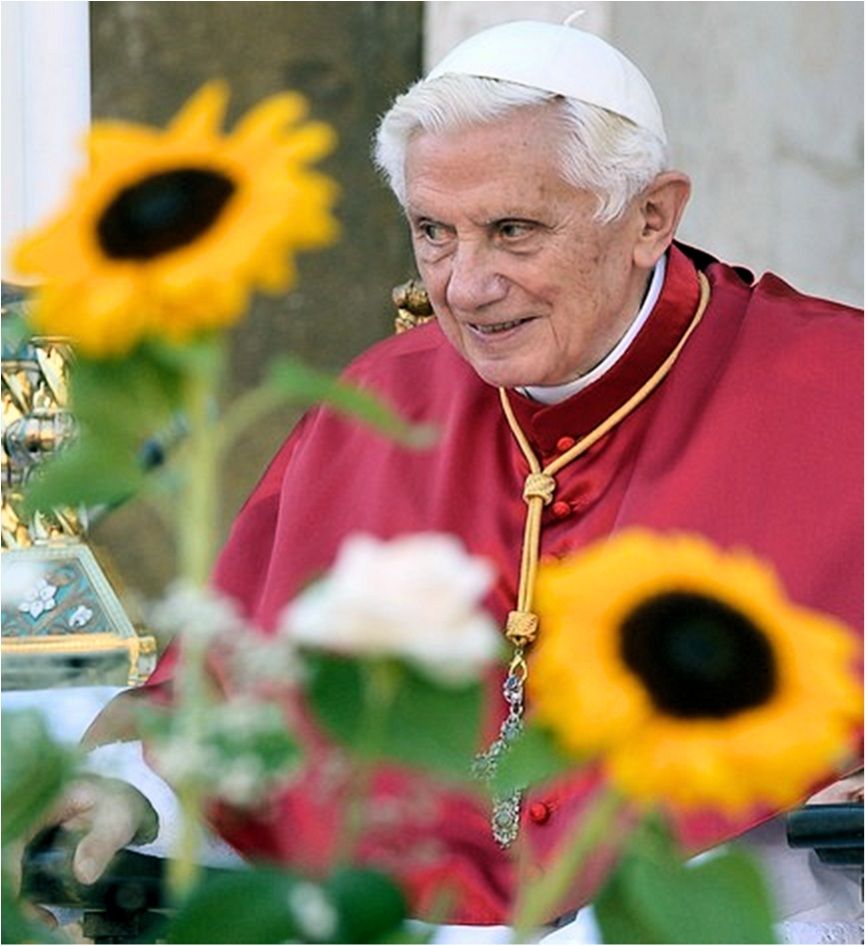 'Vatican-II has so much to say
'Vatican-II has so much to say
even to the new generations'
by GIACOMO GALEAZZI
Translated from the Italian service of

July 15, 2012
"The documents of Vatican-II contain an enormous wealth for the formation of new Christian generations," Benedict XVI said today in his homily at the Mass he celebrated on a brief pastoral visit to Frascati.
"Even among them, there is need for new evangelization, and that is why I ask yo to live intensely the Year of Faith which begins in October, 50 years since the opening the Second Vatican Council".
When his Pontificate started, a certain 'vulgate' in the mass media reiterated the claim [often made in the more than two decades when he was Prefect of the Congregation for the Doctrine of the Faith] that Benedict XVI was a 'cold' Pope, one who was incapable of warming the hearts of the masses.
And yet to demolish this stereotype once and for all, one only had to be on Frascati's Tusoolo hill at dawn this morning to climb up to the summit amid a constant stream of cars and buses, to get to the top. Many more than expected had come to see the Pope, choosing to come to his Mass instead of going to the seaside on a summer Sunday.
In the city that has given more Popes to the Church than any other city but Rome, Papa Ratzinger was welcomed like a friend, but above all, as a leader from whom one was sure to receive words of truth and comfort, which are even more necessary at a time of grave economic crisis for a place which once flourished with entrepreneurial activity. But recession has made erosive effects even here, and one can almost see it visibly.
The Pope called on the faithful to announce Christ "without being concerned about succeeding" but rather with the awareness that "the messengers of God are often not welcome".
Christians, he said, "should reacquaint themselves with Vatican II" in order to rediscover "the beauty of being Church".
"It is beautiful and very encouraging," he said, "that6 after 2000 years, we can still go ahead with the commitment to be 'formed .in Christ. We are all responsible. We are all co-responsible. The Lord calls us all, distributing different gifts for the different tasks in the Church".
He calls to the priesthood and the consecrated life, as he calls to marriage and to lay commitment in the Church and in society. What is important is that "this richness of gifts finds full acceptance, especially among young people".
Thus, he appealed: "Be united among yourselves, even as you remain open to the missionary spirit. Remain firm in your faith, rooted in Christ through his Word and the Eucharist. Be persons of prayer, in order to be always bound to Christ like tendrils to the vine".
These were strong words which did not fall into the void, to judge by the general enthusiasm of his listeners.
"We organized ourselves to let Benedict XVI fell the warmth of our affection i9n return for the spiritual support that he gives us daily with his preaching", said Mara Cancellieri, who along with many friends from the various cities of the Castelli Romani region, arrived all together at the square in front of Frascati's St. Peter's Cathedral.
But many faithful also came in from other regions. "We travelled overnight to be here," said Silvia Rimoncini, 36, president of a lay association in Osimo, Ancona province. "Personally, I took the opportunity because I also have relatives in Frascati, but our members have come because during a historic and very critical phase in our history, we feel that as young Catholics, we can show our support for the Primate of Italy, who speaks for those who have no voice. We have members who have lost their jobs and have been unable to find new employment. To pray with the Pope is an injection of confidence, and our will to lift ourselves out of current difficulties. The Pope helps us not to lose heart and to proceed again from where we were halted".
The rebirth of Frascati after the Second World War is like a tangible symbol for the possibilities of rebuilding from ruin. The Supreme German Command for the Mediterranean front was located here, and so, after the armistice of September 8, 1943, 130 American tanks razed the city to the ground.* The city had to be reconstructed stone by stone. And today the Pope of purification chose it as a symbolic place for his message of regeneration and hope.
Leading his welcomers was Mons. Raffaello Martinelli, who had worked with Cardinal Ratzinger at the Congregation for the Doctrine of the Faith.
The altar boys today took part yesterday in the first football championships among ministrants, whose huge white-and-yellow banner festooned the gates of Villa Aldobrandini
[the 17th-century noble home built for Cardinal Aldobrandini on a hilltop that has the most beautiful panoramic view in Frascati - from the Apennines in the east, to the urban sprawl of Rome and the Tyrrhenian Sea on the west].
Gianluca Franco, 40, an engineer, came with his wife and children to the Mass. "At a very sensitive phase in my life, I benefited in a special way from the 'orientation' of Benedict XVI," he said. "I was at a stage when I no longer found sense in daily living, when almost by chance, I read his JESUS OF NAZARETH, and since then, I have been captivated by the clarity and pervasiveness of his words. He almost seems a member of my family, and to be here today is the least I can do. We also went to Milan for the World Meeting of Families last month. Every time that I can, I attend his Wednesday catecheses - it has become a way for me to 'recharge my batteries'".
"It is as if to see and hear him directly is a direct reinforcement of the faith and an incentive to overcome weaknesses and the occasions when we stumble and fall. To understand the greatness of his Magisterium, the best way is to just listen and allow oneself to be pervaded by his teaching".
The most recurrent word among the faithful for what they felt in the presence of the Pope was 'emozione'.
Mons. Martinelli told his flock that Benedict XVI has come to Frascati "top confirm and strengthen us in our faith, to pray for all the faithful, for all our families, especially our children, our young people, all those who suffer in the body and in the spirit; to invoke the gift of religious and priestly vocations coming from our families".
In the past, the suburbicarian bishops of Rome were part of the college of cardinals and enjoyed privileges such as walking directly behind the Pope in papal processions. and represented him in functions at the Cathedral of Rome, St. John Lateran. In fact, they even had a cathedral in Rome, Santa Maria in Monasterio. Today, the seven suburbicarian sees are headed titularly by the cardinal-bishops, the highest-ranking among the College of Cardinals.
The present titular bishop of Frascati is Cardinal Secretary of State Tarcisio Bertone
[who, strangely, did not appear in any of the newsphotos I've seen so far!]
This pastoral visit (announced only last May) lasted barely two hours (from 9:30 to 11:30) and yet, it is very significant as the first papal visit to Frascati in 32 years. Like John Paul II before him, Benedict XVI( said Mass in the Cathedral square. Then he returned to Castel Gandolfo for the Sunday Angelus.
An erroneous news item published by the nominally Catholic Italian news agency Adista said that the diocese had solicited contributions from the faithful to 'defray' the costs of the Pope's visit. In fact, the diocese had taken up a special collection in previous Sundays to present to the Pope as a gift for his charities.
 ANGELUS TODAY
ANGELUS TODAY
July 15, 2012
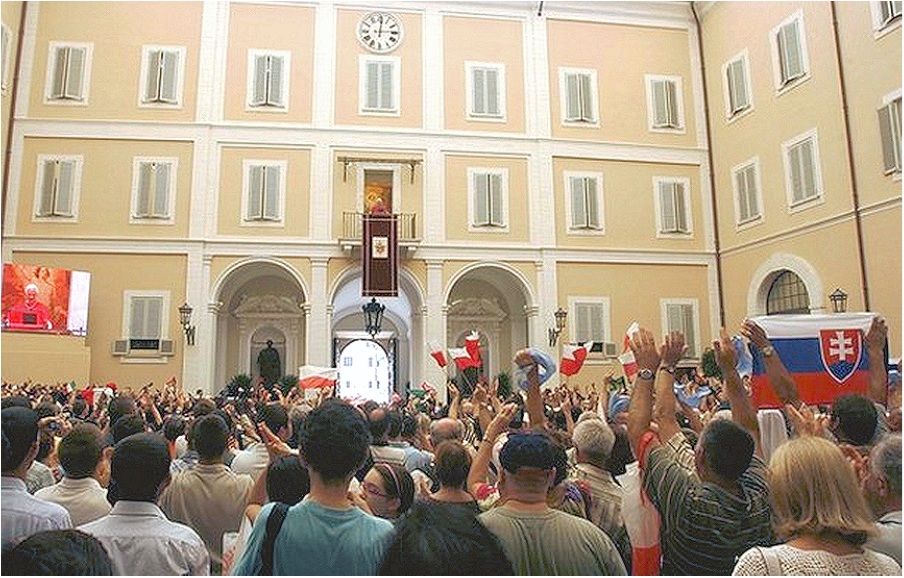
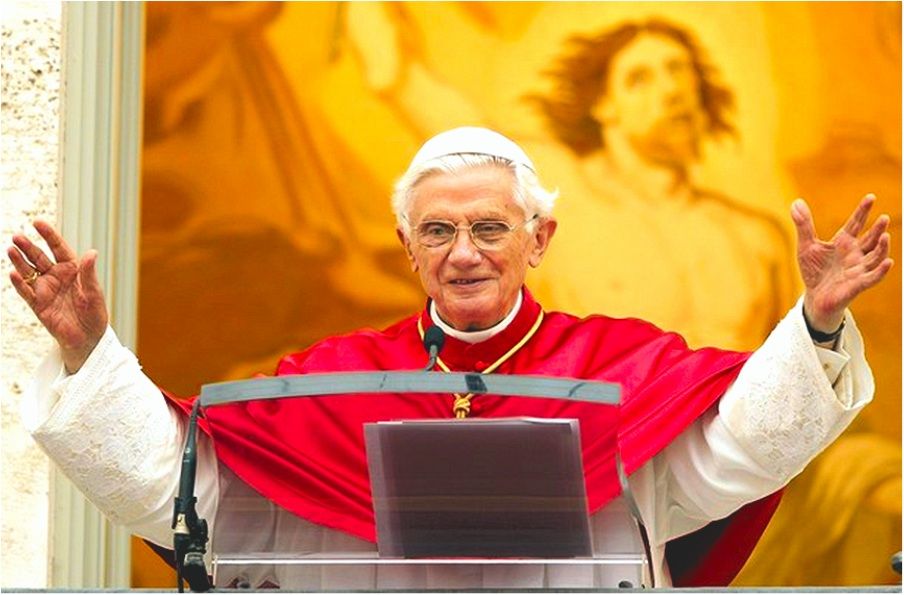
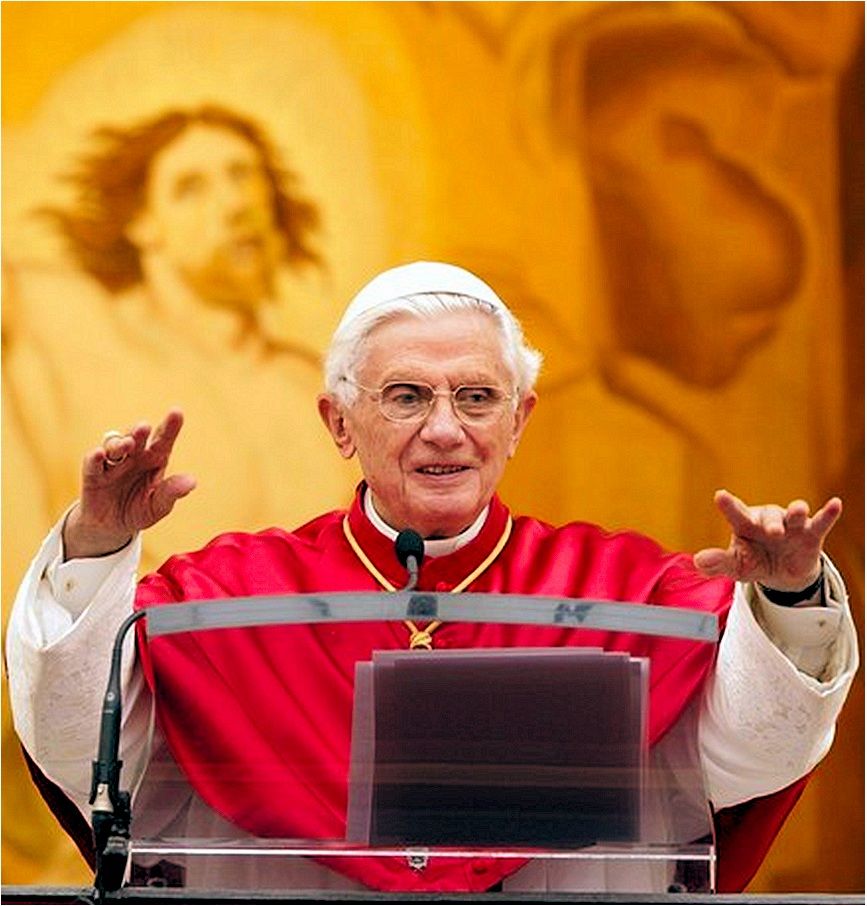 In praise of Bonaventure's
In praise of Bonaventure's
Christ-centeredness

July 15, 2012
Pilgrims sang and clapped as they waited patiently in the enclosed courtyard of the Apostolic palace in Castel Gandolfo for their midday appointment with Pope Benedict XVI Sunday for the recitation of the midday Angelus.
The Pope, who had celebrated Mass in the nearby town of Frascati, arrived slightly later than usual and was greeted by resounding applause.
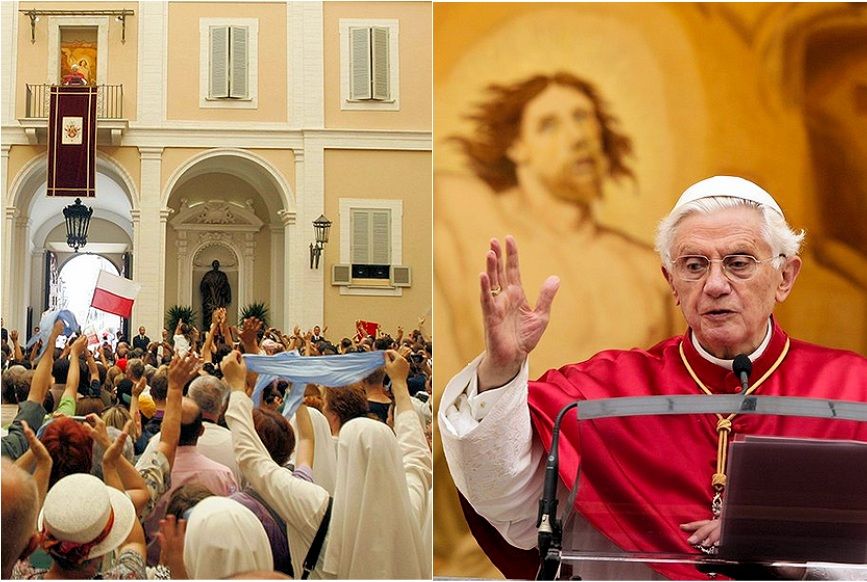
Here is a translation of the Holy Father's words at the Angelus today, which he preceded with a few words to explain why he was some minutes late for the noontime appointment:
Dear brothers and sisters:
I see that you have forgiven me for being late. I celebrated Holy Mass in Frascati, and perhaps we stayed in prayer a bit too long.
In the liturgical calendar, July 15 is the liturgical memorial of St. Bonaventure of Bagnoregio, Franciscan, Doctor of the Church, and successor of St. Francis in the leadership of the Order of Friars Minor.
He wrote the first official biography of the Poverello, and towards the end of his life, was also the Bishop of this Diocese, Albano. In one of his letters, Bonaventure wrote: "I confess before God that the reason that made me love more the life of the Blessed Francis is that it resembles the Church in its beginings and in its growth" (Epistula de tribus quaestionibus, in Opere di San Bonaventura. Introduzione generale, Roma 1990, p. 29).
These words bring us directly to the Gospel today, of this Sunday, which presents the first mission of the Twelve Apostles when Jesus first sent them forth. "Jesus summoned the Twelve and began to send them out two by two", St. Mark writes. "He instructed them to take nothing for the journey but a walking stick - no food, no sack, no money in their belts... to wear sandals but not a second tunic" (Mk 6,7-9).
Francis of Assisi, after his conversion, practised this Gospel to the letter, becoming a most faithful witness of Christ. Associated singularly with the mystery of the Cross, he was transformed into 'another Christ', as St Bonaventure presents him.
St. Bonaventure's whole life as well as his theology was centrally inspired by Christ. We find such Christ-centeredness in the second reading of the Mass today (Eph 1,3-14), the celebrated hymn in St. Paul's Letter to the Ephesians, which begins: "Blessed be the God and Father of our Lord Jesus Christ, who has blessed us in Christ with every spiritual blessing in the heavens."
The apostle then shows how this plan of blessing was realized, in four passages all beginning with the same words, "In him...", referring to Jesus Christ.
In him, the Father chose us before the creation of the world. In him, we have redemption through is blood. In him, we have become heirs, predestined to be 'in praise of his glory'. In him, everyone who believes in the Gospel will receive the seal of the Holy Spirit.
This Pauline hymn contains the view of history that St. Bonaventure contributed to disseminate within the Church: All history has Christ in the center, who guarantees novelty and renewal in every age.
In Jesus, God has given and said everything, but because he is an inexhaustible treasure, the Holy Spirit will never finish revealing and actualizing his mystery. That is why the work of Christ and his Church never regresses but always progresses.
Dear friends, let us invoke the Most Blessed Mary, whom we celebrate tomorrow as Our Lady of Mt. Carmel, so she may help us, as St. Francis and St. Bonaventure, to respond generously to the call of the Lord to annoucne his Gospel of salvation with words but above all, with our life.
After the prayers, he had a special message in Polish:
Tomorrow, we will celebrate the liturgical feast of the Blessed Virgin Mary of Mount Carmel, the Mother of God of the scapular. Blessed John Paul II carried and honored the scapular, sign of special entrustment to her. To all his co-nationals in Poland, in the world, and you who are here in Castel Gandolfo today, I pray that Mary, the best of all mothers, will wrap you in her mantle in the struggle ahainst evil, intercede in your requests for graces, and show you the way that leads to God. Praise be to Jesus Christ!

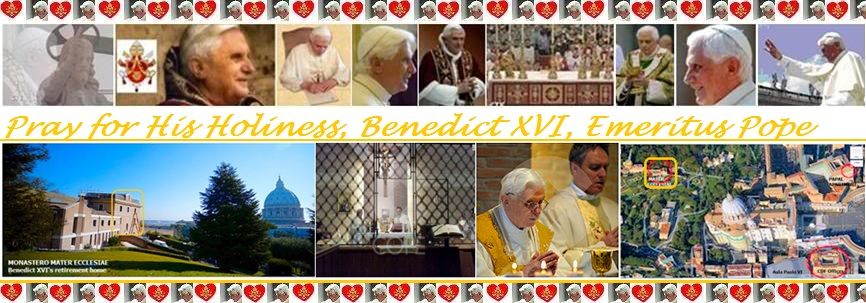
[Modificato da TERESA BENEDETTA 16/07/2013 13:09]